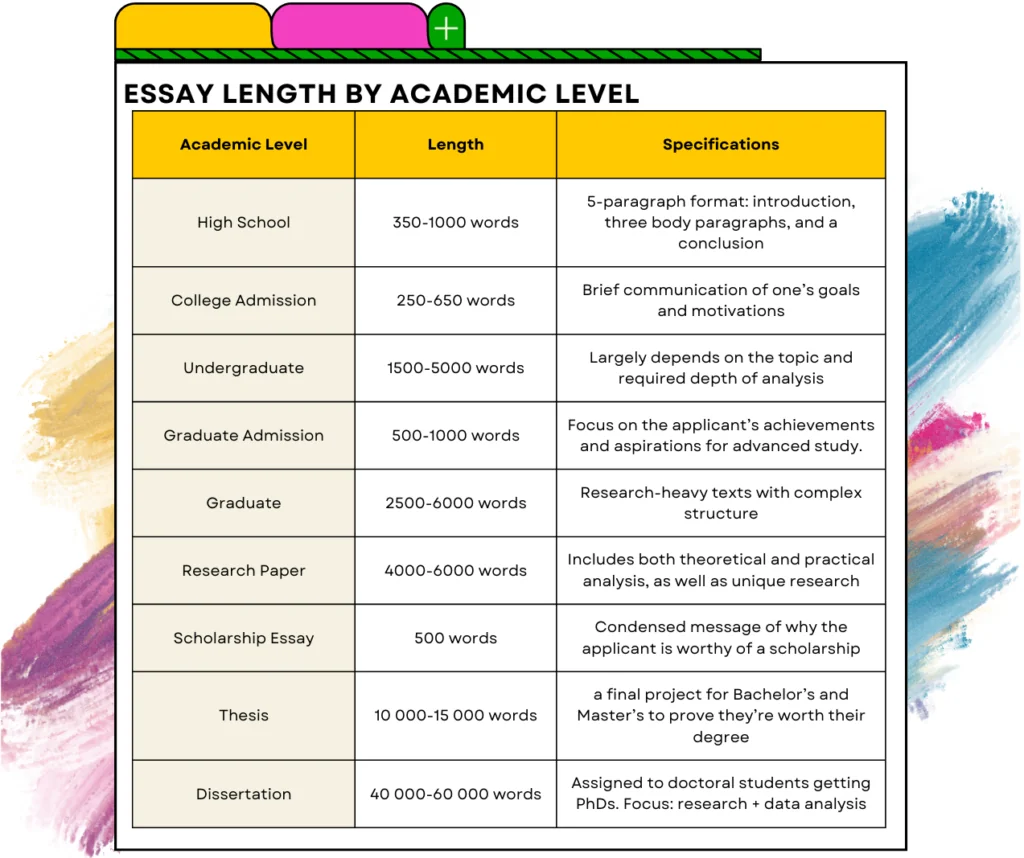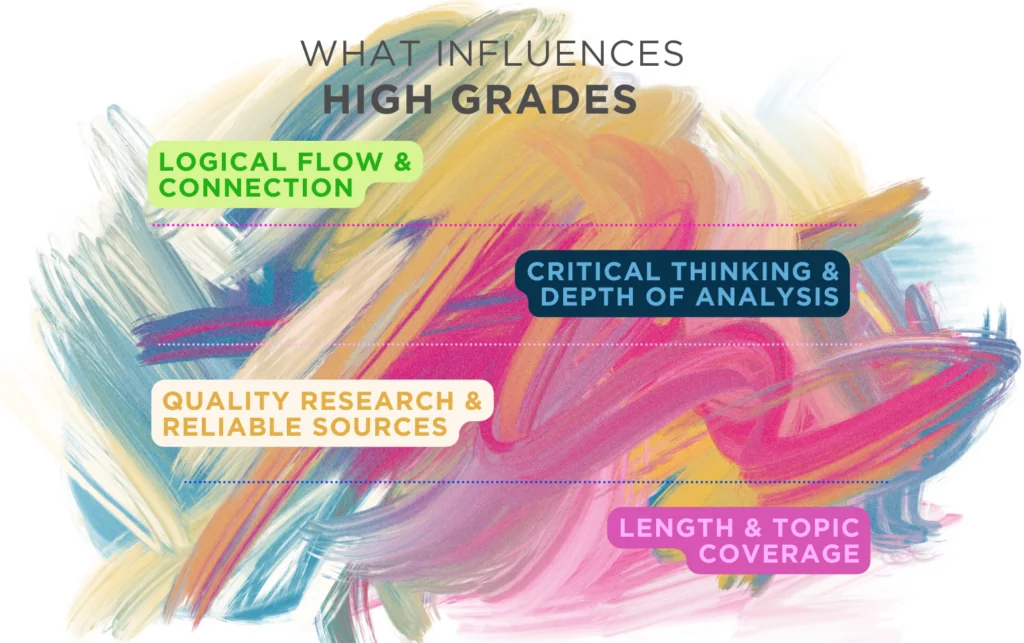We all had those tasks where we spent hours and hours writing essays, trying to put together all our thoughts and available materials. Sometimes, even after an hour of writing you would find yourself sitting in front of a 350-word page, wondering how you could spend so much time only to write so little. Other times, you had so many ideas that could fit nicely into the topic that putting them all on paper would mean exceeding the intended word count. But have you ever wondered who sets those limits? And how long a normal essay should actually be and why? Well, we know this topic bothers many students, so we decided to finally address this issue and explore the spectrum of an average essay word count.

✅ AI Essay Writer ✅ AI Detector ✅ Plagchecker ✅ Paraphraser
✅ Summarizer ✅ Citation Generator
What Influences The Length of an Essay And Is It That Important?
There are a lot of various essays you can be asked to write: personal statements, literature analysis and reviews, persuasive and narrative essays, etc. And yes, the type of essay is one of the major factors that influence the word count set by your educators. After all, the number of paragraphs that you need to include also depends on the type of writing you are doing. Yet, it is not the only aspect that is considered, as other factors include topic, subject, and academic level.
For instance, some themes might need more detailed explanations and supporting ideas, especially in subjects like literature, while topics related to science or management often require more concise writing. The academic level also plays a role. As you will see below, high school essays are generally shorter and less complex than those required in college or university. Additionally, different types of essays, like narrative or persuasive, have their own length requirements.
❓Now, does the length of an essay determine its quality?
Not necessarily. Short essays can be just as impactful and well-argued as longer ones, provided they cover the topic thoroughly despite their briefness. On the other hand, a lengthy essay filled with unnecessary information can detract from the overall argument and logic. As a whole, the quality of an essay is judged by how well it addresses the topic and supports its thesis, rather than its length. So yes, short essays can be good, and long essays can be bad—it all depends on the content and clarity of the writing.
How Many Words Should an Essay Be Depending on Its Type
As we have established, when it comes to essay lengths, it really depends on what type of essay you’re writing as well as the grade level you are writing for.
High school essays typically range from 350 to 1,000 words. These are usually structured in the standard five-paragraph format, including an introduction, three body paragraphs, and a conclusion. Moving up to college admission essays, the word count is more concise, usually between 250 to 650 words. Here, applicants are expected to express their motivations and goals more briefly.

For undergraduate essays, the range broadens significantly, spanning from 1,500 to 5,000 words. The subject matter often determines the length here, the depth of analysis required, and the specific guidelines of the assignment. Graduate admission essays are similar to undergraduate admission essays but can be slightly longer, typically between 500 to 1,000 words. These essays often focus on the applicant’s achievements and aspirations for advanced study.
At the graduate level, essays can be much more extensive, often ranging from 2,500 to 6,000 words. These texts are usually research-heavy and demand a more complex structure to adequately cover the topic. It’s also important to note that these are general guidelines; specific requirements can vary by institution and discipline. Always check the provided requirements. When in doubt, consult your instructor to make sure you meet the expectations.
How Long is an Essay Introduction, Body, and Conclusion
Knowing the desired overall length of your essay is helpful and all, however, it is much better when you understand how much information you need to present in each of the separate paragraphs. Some essays may be just 1 paragraph long, so everything you need to write should be written there. Others are usually divided into 3,4, or even 5 parts, so knowing which ones to make shorter or larger can be rather useful. Besides, with this information, you are more likely to organize all the details logically and clearly.
🗣️Introduction
Typically, the introduction should be concise, usually, one paragraph for essays under 3000 words, providing a hook, background information, and a clear thesis statement (your key point or discussed topic). For more complex papers, the introduction might stretch to two or three paragraphs.
🧐Body
The body of the essay, being the core part, is the longest section, generally composed of 1 to 4 paragraphs, each developing a separate point or argument. In longer essays, the body might include even more paragraphs to cover the topic thoroughly.
❗️Conclusion
The conclusion, like the introduction, is usually brief, summarizing the main points in a single paragraph. It can be anywhere from 2 to 4 sentences, depending on how well you can condense the main points mentioned in the text above.
Nonetheless, despite these guidelines, the number of paragraphs in an essay isn’t set in stone. The key is to write each section so it fulfills its purpose:
- the introduction to engage and outline
- the body to argue and detail
- and the conclusion to wrap up convincingly.
Thus, whether your essay is short or long, clarity and coherence are what truly count.
How Long Should an Essay Be to Grade High
To score high on an essay, meeting length requirements is important but not the only factor. Essays at different academic levels come with varying expectations.

First, your essay should have a logical flow, with each paragraph connecting smoothly to the next. Critical thinking and depth of analysis are also vital. Examiners look for essays that go beyond surface-level understanding, demonstrating your ability to engage with the topic critically. This includes analyzing different viewpoints, synthesizing information, and drawing insightful conclusions. Additionally, the quality of your research and the reliability of your sources can make a big difference. Using credible sources to back up your arguments shows that you have done your homework and understand the subject matter well.
Length matters because it allows teachers to assess whether you have enough space to develop your argument thoroughly. Each paragraph should have a clear topic sentence, supporting evidence, and a concluding sentence to tie the ideas together. While it’s important to meet minimum word counts, adding fluff just to reach a certain length isn’t the right way to do it. On the contrary, it can even weaken your essay. Focus on developing your ideas fully and use evidence and examples to support your points.
If you find yourself under the word count, try adding more detailed examples or exploring different aspects of your topic. On the other hand, if you exceed the limit, check if every paragraph is necessary to your argument. Keep your writing concise and to the point, so that each sentence adds value to your overall argument. Remember, a concise and well-argued essay will always score better than a lengthy, unfocused one.
Working with Essay Length: What to Do to Make It Shorter or Longer
Sometimes you just need to hit a couple more words to make your essay a perfect length. Or, on the contrary, you may be just a few sentences longer than needed. But no need to worry here. There are handy strategies for both shortening and lengthening your paper to meet the requirements.
If you need to make your essay longer:
- Start by adding relevant quotations. They can improve your arguments and increase your word count without feeling like filler (besides, many professors actually like it when students properly use the given literature).
- Including more examples and detailed descriptions is another effective way to expand your essay.
- Don’t forget to use transitional expressions to connect ideas smoothly; they naturally add words and improve readability.
- Also, adding more references can make your essay more credible and longer. Just don’t forget to add a few informational details from those references, all right?
On the flip side, if your essay is too long:
- Try using the active voice instead of the passive voice—it’s more concise and makes your writing more direct.
- Remove unnecessary transitions that don’t add value to the flow of your argument.
- Cutting out redundant adverbs and adjectives can significantly trim down your word count.
- Avoid long introductory phrases like “it is believed that” or “there are” to keep your sentences straightforward and to the point.
- See if you can remove the word “that” from your sentences without losing meaning.
Balancing your essay’s length with content quality can make your writing more effective and engaging and help you meet the requirements without sacrificing clarity or depth.
Conclusion
In wrapping up, hitting the right balance between essay length and quality is key for effective writing. Whether you need to add a few more words or trim down some excess, the tips we’ve covered can help without losing the essence of your essay. Focus on making your arguments clear and strong, and use the tricks for expanding or tightening your text as needed. Remember, a good essay isn’t just about hitting a word count—it’s about making your ideas come across well. Keep these pointers in mind, and you’ll find it easier to handle any word count challenges that come your way.
FAQ
Follow us on Reddit for more insights and updates.





Comments (0)
Welcome to A*Help comments!
We’re all about debate and discussion at A*Help.
We value the diverse opinions of users, so you may find points of view that you don’t agree with. And that’s cool. However, there are certain things we’re not OK with: attempts to manipulate our data in any way, for example, or the posting of discriminative, offensive, hateful, or disparaging material.